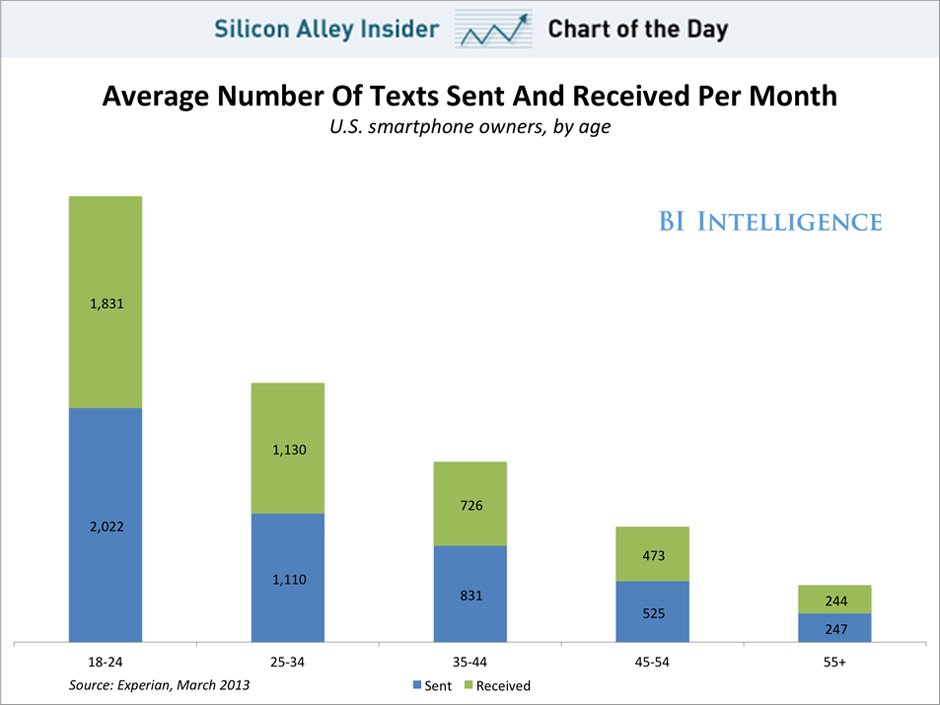A few months ago I had a piece on the blog titled 'The most engaging method of communication you're not using' about the increased growth and the massive engagement levels driven with text communications.
I used the below chart from Business Insider to back up much of my take on how if you really want to engage with people - employees, candidates, prospects - whomever - that getting permission to communicate via text was the way to go.

A practically equal number of texts sent and received across all age cohorts indicate incredible engagement and interaction in the medium. When people receive a text, they generally reply. And the sheer volumes of messages being sent by members of the 18-34 year old age range both indicate that more and more texting (or similar short, disposable communications tools), will need to become a tool in your toolbox if you want and need to effectively connect with people.
Want a more practical and real-world, (ok a sports world) example of how this change in communication methods is playing out with top talent?
Last week American soccer star Clint Dempsey transferred from Tottenham, the English Premiere League club he had been playing for, to the Seattle Sounders of the US-based Major League Soccer. This was pretty big news for US soccer fans, as well as relatively important news for world soccer in general.
Dempsey is not only a club-level star, he is probably the US National Team's best all-around player, had seen success in a top-flight European league, and is still relatively close to his prime playing years. And with the World Cup only one year away, for a player of Dempsey's ability and national team importance to move to Major League Soccer and away from the English Premier League was a big story.
But back to the point of this post and how texting plays into this.
Check two excerpts from a recent SI.com interview with Dempsey, as he describes the process of changing clubs, his role on the US National team, and some of the communications that took place between him and club and country leaders over that time.
SI.com: Did you have a heart-to-heart at one point with Tottenham manager André Villas-Boas?
Dempsey: I didn't. I really just had a heart-to-heart with my family, talked to my wife, to my mom and dad, to my brothers and my sister. And had a few sleepless nights just going over that decision and wanting to make sure I was making it for the right reasons, and that I felt good about it. You have to get that gut feeling that you're doing the right thing. It was good for me to be back with Tottenham in preseason and be around it to make that decision instead of being removed from it on vacation in the summer. I was able to be there, be in training and really think about it.
After I left, [Villas-Boas] sent me a really good text. He was happy with what I was doing and I was going to be part of his plans. He wished me the best. I'm grateful for him. He gave me an opportunity to see what it was like to play at a big club. So I'll always be grateful for that, just to get that experience.
Later in the interview, Dempsey discusses some upcoming US Men's National Team games and his conversations with coach Juergen Klinsmann.
SI.com: Have you had a chance to talk to Klinsmann since you made the decision to go to Seattle?
Dempsey: Just text. He said he wasn't going to bring me in for this game, but he was looking forward to making history in Costa Rica [in the World Cup qualifier on Sept. 6. The U.S. has never won in Costa Rica in nine tries] and making sure we book our tickets to Brazil [for the World Cup]. I'm excited about getting my 100th cap, and hopefully we do make history in Costa Rica.
Did you catch that?
Dempsey leaves one high-profile English Premiere League team Tottenham - and only communicates with Villas-Boas, his former manager there via text. Text me, bro.
Text me, bro.
Then as the move to Seattle impacts his fitness and availability for some upcoming National Team games and again he only communicates with US manager Klinsmann via text.
A top talent like Dempsey makes a major career move and the two most important executives involved in the process only interact with him via text message.
And no one, not Dempsey, not Dempsey's family, not the author of the SI piece, raises any objections or questions about the choice of text messaging as the communication method. No one asks, 'He only sent you a text? He didn't call? He didn't have a meeting with you?'
Look at Dempsey's quote again "After I left, [Villas-Boas] sent me a really good text."
He sent me a really good text.
And it seems like for Dempsey, 30-year old soccer star, that is just fine.

 Steve
Steve



